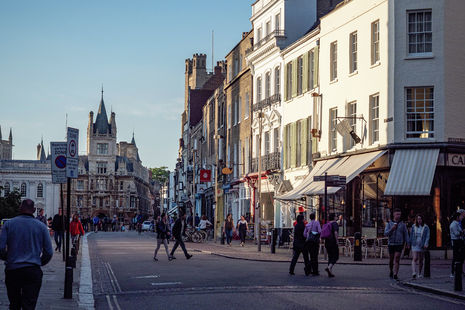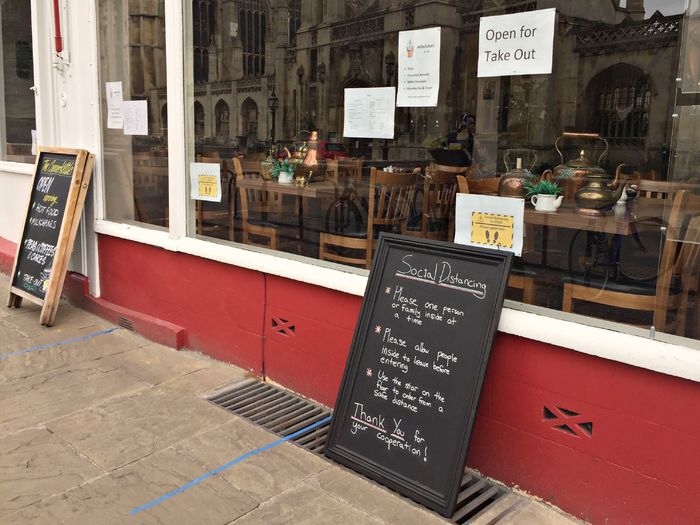Centre for Cities report warns of post-Covid risks for Cambridge’s economy
The ‘Fast Growth Cities – 2021 and beyond’ report points to key challenges in Cambridge, including rising unemployment, unaffordable housing and slower high street recovery

The Centre for Cities think tank published a report on Tuesday (09/03) warning the government not to overlook the risk that Covid-19 could pose for Cambridge’s long-term prosperity.
The report investigates the development between 2015 and 2018 of, as well as the potential risks caused by Covid for, the UK’s Fast Growth Cities (FGCs), comprising Cambridge, Oxford, Milton Keynes, Norwich, Peterborough and Swindon.
The ‘Fast Growth Cities - 2021 and beyond’ report includes findings in six key areas: labour markets and skills & education; businesses and growth; high streets and city centres; housing and planning; transport; and the economic impact of the pandemic.
According to the report, before the pandemic Cambridge was one of the fastest growing local economies. With 60% of its workers coming from outside of the city, Cambridge has been an important source of employment and research.
However, 3.9% of eligible adults in the city are currently claiming employment-related benefits, which is an increase of 2.3 percentage points in comparison to March last year. Additionally, 12.6% of workers in Cambridge are being supported by the furlough scheme.
The report also shows that, among the FGCs, Norwich, Oxford and Cambridge saw slower recoveries of their high streets after the first lockdown due to their reliance on visitors outside the city centres, such as students and tourists.
In a press release, Centre for Cities Executive Chief Andrew Carter acknowledged that “Cambridge has enjoyed several years of economic growth which has benefited people living in the city, and the whole UK through its growing contribution to the Treasury.”
However, he warned that “it would be a mistake to think that [the city] has escaped the economic damage done by Covid-19 and will need support to bounce back”.
Carter added that “in the short-term, practical measures to help Cambridge’s businesses reopen will be necessary, but in the long-term, more substantive changes to skills and training are needed to protect people’s jobs from economic crashes.”
According to the report, the immediate focus of FGCs and the government should be on economic recovery. In the short-term, the report urges the government to provide guidance on how Cambridge firms can make the most of the available financial support, such as the business support loans on offer.
Longer-term government support for Cambridge’s economic growth should focus on measures such as providing adults with better education opportunities, attracting high-skilled, high-paying businesses into the city, and building more affordable homes. This last measure is especially urgent as the report points out that Cambridge is the third least affordable city in the UK in terms of housing.
A key challenge identified by the report are the limited powers of urban local governments in England despite the disproportionate contribution of cities to the broader economy. Thus, the Centre for Cities and FGCs also call on the government to divert more power and money away from Whitehall and to city councils. Benefits of this are already visible in Cambridge, where 900 sustainable homes will be delivered with the help of funding provided by the city’s devolution deal with the government and additional council money.
According to a press release, the Leader of the Cambridge city council and his counterparts in other FGCs have welcomed the government’s plans to move forward with plans for the Oxford-Cambridge Arc, which aims to help coordinate infrastructure, environment and new developments in the area between Oxfordshire and Cambridgeshire.
They have also called on the government to extend the planned East-West Rail project and the electricity line eastwards to Norwich, which would help meet ambitions for a zero-carbon future.
In light of the report’s findings, Leader of the Cambridge city council, Councillor Lewis Herbert said: “Sectors of employment that have been struggling like retail and hospitality are now working to recover after a year of on-and-off lockdown, and the hardship by so many local small businesses. Too many people have lost jobs locally and need a route back.
“The new analysis also underlines that growth and prosperity has not benefited the lives of everyone in Cambridge. As we look forward to recovering from the impacts of coronavirus, we are determined to make that recovery both inclusive and a big step towards a net zero Cambridge, so that everyone can benefit from a greener recovery.”
Herbert also acknowledged that “the Centre for Cities report focus on greater investment in adult skills is vital so those now without a job and more local people can move into higher paid jobs.”
He continued that “the city council is determined to use the report’s conclusions to work with all our businesses, our two universities and all our local communities to build a better future for everyone who lives, works and studies here.”
 News / SU reluctantly registers controversial women’s soc18 December 2025
News / SU reluctantly registers controversial women’s soc18 December 2025 News / CUP announces funding scheme for under-represented academics19 December 2025
News / CUP announces funding scheme for under-represented academics19 December 2025 Features / Should I stay or should I go? Cambridge students and alumni reflect on how their memories stay with them15 December 2025
Features / Should I stay or should I go? Cambridge students and alumni reflect on how their memories stay with them15 December 2025 Fashion / The art of the formal outfit 18 December 2025
Fashion / The art of the formal outfit 18 December 2025 Lifestyle / Summer lovin’ had me so… lonely?18 December 2025
Lifestyle / Summer lovin’ had me so… lonely?18 December 2025









